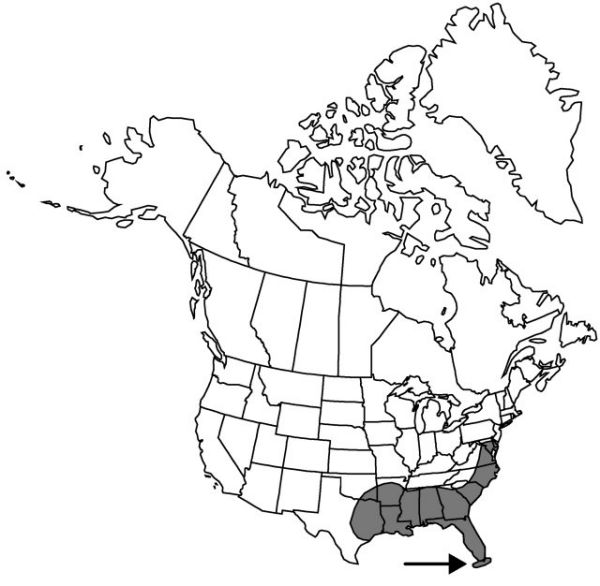Smilax smallii
Bull. Torrey Bot. Club 21: 430. 1894.
Vines; rhizomes irregularly tuberous, branched, thick, to 1.5+ m. Stems perennial, climbing, greenish or reddish-brown, terete, 10+ m × 27 mm, woody, glabrous, glaucous when young; prickles few, scattered, recurved, flattened, 3–4 mm. Leaves evergreen, distally disposed (± evenly disposed on immature plants); petiole 0.3–1.3 cm; blade deep green, often variegated, drying to pale green, lanceolate-elliptic to narrowly ovate, prominently reticulate, 5-veined from base, 5–6.6 × 1.7–3 cm, abaxially glabrous, not glaucous, base rounded to cuneate, margins entire to undulate, apex acuminate. Umbels many, axillary to leaves, 7–15-flowered, loose to dense, hemispherical to spherical; peduncle 0.5–2.3 cm. Flowers: perianth green; tepals 3–6 mm; anthers ± 1/5 as long as filaments; ovule 1 per locule; pedicel (0.3–) 0.5–0.7 (–1) cm. Berries black, globose to compressed, 5.5–8 mm, glaucous.
Phenology: Flowering Jun–Jul.
Habitat: Rich woods, pinewoods, streambanks, edges of fields, swamp margins, ditches, well-drained but not dry soils
Elevation: 0–600 m
Distribution

Ala., Ark., Del., D.C., Fla., Ga., La., Md., Miss., N.C., Okla., S.C., Tex., Va.
Discussion
Smilax smallii is the highest-climbing species of Smilax within the flora and it is particularly conspicuous during the winter. It has been used as an ornamental and as a winter decoration, primarily in the Christmas trade. The starchy rhizomes and succulent, immature stems were used for food by Native Americans and early settlers.
Selected References
None.
Lower Taxa
"thick" is not a number.